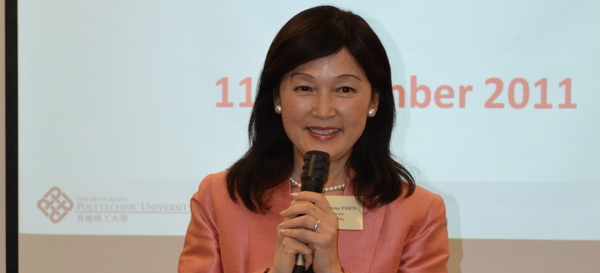|
|
|
|
|
|
|
How serious is Hong Kong's ageing problem? |
|
|
How serious is Hong Kong's ageing problem?
|
Hong Kong’s population is ageing. The size of its workforce is shrinking as the prime working age population declines. In this issue of Excel@PolyU, Teresa Tsien, Co-Director of PolyU’s Institute of Active Ageing under the Faculty of Health and Social Sciences, was interviewed for her insights on this issue. Q1: How serious is Hong Kong’s ageing problem? The ageing trend is becoming a major concern in Hong Kong. At present, one out of eight people in Hong Kong ages 65 or above. As people are living longer and getting older, the average life expectancy is 80 and 86 for men and women respectively in 2010. In 20 years’ time, one in every four Hong Kong residents will be 65 or above. By 2050, Hong Kong is forecasted by the World Health Organization to rank fifth in the world for cities with the largest percentage of older adults, i.e. 40% of the population in Hong Kong will be 65 or above. Q2: What are the implications of the rapidly ageing population on society? The rapid ageing population will lead to the continuous rise of the old age dependency ratio (i.e. the ratio of the non-working population who are 65 or over being supported by the working population age 15 to 64) from 172/1000 (172 non-working supported by 1000 working population) in 2010 to 227/1000 in 2021. This also implies a constant decline in labor force in Hong Kong. On one hand, as Hong Kong people are living longer and getting older, the chances of dependency on medical, welfare and other services will be greater. However, I would like to take a positive angle to look at the ageing issue. I see this group of older adults as an emerging pool of human capital to society. As 85% of the elderly population is ambulant and able-bodied, if they are offered an opportunity to continue to lead an active and independent life to share their knowledge, insights and experiences, they can continue to be valuable assets to society by serving as consultants, advisors, mentors or volunteers. Q3: What kind of problem will the ageing population create on the economic aspect? Compared to younger people, the elderly are more conservative in consumption and investment. Therefore, an ageing population may impact on the growth of the Hong Kong economy. However, in the next decade, we will be seeing a new generation of elderly who are better educated and financially sound with stronger consumption power. This group of elderly will have higher expectations and stronger demands for quality of life and services. I see great business opportunities in an emerging ‘silver market’ by the development of new products and services in a wide variety of industries such as banking, insurance, health, beauty, housing, transportation, design, technology, fashion, etc. catering to the changing demands of this group of senior customers. An ageing-friendly city will definitely encourage our elderly to actively participate in social activities and become a contributive member of society. Q4: What is the role of PolyU’s Institute of Active Ageing (IAA) in addressing the ageing population issue? The PolyU’s Institute of Active Ageing views this gradual demographic change as an excellent opportunity to support Hong Kong in its development into an age-friendly society better equipped to meet the needs and potentials of its ageing population. The Institute pools scholars, researchers and practitioners from 23 disciplines across PolyU in the broad categories of health and human services, finance and business, policy and management, design, engineering and technology, environmental sciences and biotechnology, textiles and clothing, and leisure and recreation, to create synergistic opportunities for innovative cutting-edge research on ageing and interdisciplinary educational programmes related to ageing studies. We believe in engaging professionals in private and public sectors, the general public, older adults and the elderly to collaborate in the city’s evolution towards active ageing. By offering the credit-bearing and non-credit bearing courses for those who are 50 or above, IAA intends to empower the older adults and to improve their self-esteem by lifelong learning. IAA has also initiated the “Project for the Third Age” (age 50 or above) which encourages participants to maximize their potentials through volunteering work and gap-filling paid jobs in the community. Q5: Will there be a solution to Hong Kong’s ageing population problem? Further to the suggestions of extending the retirement age and encouraging younger couples to have more children, I would like to suggest a fundamental solution by transforming the elderly from burden to human capital. If we can empower our elderly to be self-reliant and take personal responsibility for their life through our structured courses and activities, we try to keep this group of able-bodied elderly independent, happy, active, healthy and contributive to society for as long as practical. On one hand, the government can save a lot of resources in medical and welfare expenses if the elderly are happy and healthy. On the other hand, this group of active elderly can continue to contribute their time and expertise to society. This will be a group of unlimited source of human capital with their abundant time and rich experience.
|
